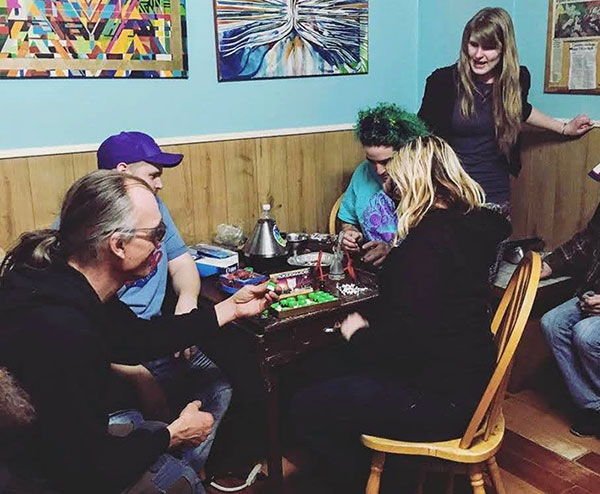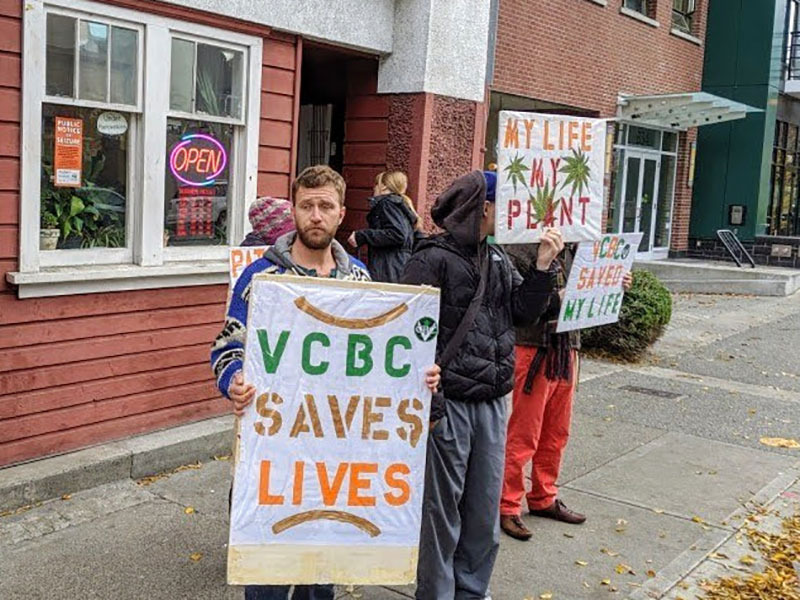Despite years taking opiates prescribed for her pain, Julia Veintrop never found relief more effective and lasting than a potent cannabis cookie.
Since diagnosis in 2009 at age 21, Veintrop underwent seven laparoscopic surgeries to treat her advanced cervical cancer and was dealing with debilitating residual pain from cervical dysplasia and endometriosis.
Doctors had first prescribed her OxyContin for the pain and then switched her to methadone. But Veintrop was trying to taper off from methadone due to the short relief and frustrating side effects.
Then she stopped by the Victoria Cannabis Buyers Club in a storefront off Blanshard Street in Downtown Victoria. Veintrop had heard about the club as a teen attending Hempology 101 meetings on Wednesday nights in the city’s Beacon Hill Park, where participants shared information on cannabis use. She had been a member since 2006, but didn’t use its offerings much.
Veintrop told the “budtender” in the club about her efforts to end her methadone use and her withdrawal symptoms. They recommended a cannabis cookie with 75 milligrams of THC.
Veintrop tried the cookie. A couple of hours later, she couldn’t remember feeling so pain-free.
“It really was an amazing light in the darkness for my healing,” Veintrop said in an interview. “I could buy a cookie and feel a million times better than taking anything my doctors were going to give me.”
With cookies and then hash brownies, which came with up to 1,000-milligram doses, Veintrop was able to end her methadone use, which required her to go to the pharmacy daily. Cannabis, she said, could bring her pain from a 9.5 out of 10 to a 1.5 with much more flexibility.
“I don’t know if I’d be here today without that alternative being there.”
Veintrop, now 34, is one of more than 8,000 people who access low-barrier medical and therapeutic cannabis for a variety of physical and mental health conditions through the Victoria Cannabis Buyers Club.
The compassion club is one of few in Canada and has operated under near-constant threat of closure, lawsuits and numerous raids since it opened in 1996, which only intensified after recreational cannabis was legalized and regulated in 2017.
But as the club is threatened with closure, five prominent substance use researchers are calling on Ottawa to exempt it from cannabis legislation so it can continue providing low-cost medicine to those who otherwise could not access it.
Cannabis use has also been shown to divert people from increasingly toxic criminalized substances such as heroin, fentanyl, methamphetamine and cocaine.
“For decades, VCBC has addressed an important gap by providing access to cannabis for people who live with chronic health conditions and may not be able to access cannabis otherwise,” the experts wrote in a March 28 letter to the federal ministers for health and mental health and addictions shared with The Tyee.
The club requested a federal waiver to continue operating in April 2021, and Health Canada declined to comment on the status of the submission. The federal health minister has the power of exemptions “for a medical or scientific purpose or is otherwise in the public interest.”
“We believe that exempting VCBC under the Cannabis Act is in the public interest, given the current overdose crisis and the absence of a plan to ensure equitable access to cannabis for therapeutic purposes,” continued the letter.
Cannabis has been legal for therapeutic purposes in Canada since 2001, a hard-fought shift Victoria Cannabis Buyers Club members and volunteers helped lead. Membership at the club requires a note from a doctor recommending cannabis use, and that the individual be 18 or older.
Evidence shows that cannabis can help alleviate symptoms and conditions including pain, nausea, appetite loss, anxiety, depression and insomnia, and it is also widely used as a complementary therapy for people with HIV, arthritis or cancer.
“We want to provide options for folks to address their symptoms in a way that works for them... and we’re leaving this population that has very important health needs, completely left alone,” said Marilou Gagnon, a University of Victoria professor and scientist at the Canadian Institute for Substance Use Research who co-authored the letter.
Cannabis is also a well-documented harm reduction strategy amid the worsening toxic drug crisis, which killed 2,224 people in B.C. last year. It offers an alternative to criminalized substances for pain management, which many people turn to when prescribed medications are inaccessible or don’t cut it.
“We need to throw at this crisis every solution that we can. This is an excellent substitution that we’re taking away from people,” added Gagnon.
Since legalization of recreational cannabis, the unlicensed club has been raided in 2019 and 2020 by B.C.’s Community Safety Unit, run by the Ministry of Public Safety and Solicitor General.
Now, its founder and the organization are facing a combined $6.5 million in fines that could close the club for good.
The Community Safety Unit was created in 2018 to oversee and enforce compliance with B.C.’s Cannabis Control and Licensing Act. The unit’s officers focus on the illegal sale of cannabis and have the power to enter retailers and seize cannabis, among other enforcement actions. In addition to criminal penalties of up to 12 months in jail or $100,000 in fines, the CSU can issue administrative fines as it has to the VCBC.
“We really do need these ministers and bureaucrats and government to understand how beneficial cannabis can be in this opioid crisis we have,” said club founder Ted Smith, who personally faces more than $3.5 million in fines. “We’re saving lives and we’re being ignored and punished for doing it.”

Smith said he and the club will challenge the fines in court and request an injunction against future raids. They are currently waiting for a court date to be set.
The non-profit club provides much different and more accessible medical options than what anyone could find commercially. While recreational cannabis is now available, prices are high and edibles are capped at 10 milligrams of active ingredient, a fraction of a therapeutic dose for many.
The Victoria Cannabis Buyers Club sells a 1,000 milligram brownie for about $10, and offers other methods of consumption such as suppositories that are much cheaper and easier than it would be to eat the equivalent dose in commercial recreational edibles. A typical 10-milligram cookie sells for around $12 in B.C. right now.
And for many members, the club space is just as therapeutic as the product. There is a space to smoke and socialize, known as the Box, and the staff and volunteers behind the non-profit’s counter are there to discuss your symptoms and options.
Veintrop said the club was a “bright light” in her life as she withdrew from methadone, providing community and connection during her difficult and isolating health journey. She later began working at the club and joined the board for three years ending in 2020.
“It saved my life, being able to come to buy a cookie and look over in the Box and see my friends,” she said. Veintrop’s pain has since lessened and she now uses cannabis much less frequently, still purchasing by mail order from the club to her current home in East Vancouver.
For Smith, it is frustrating to be kept in limbo and under constant threat of being shut-down when the research and feedback indicates they are saving lives. He and the club are still awaiting a hearing date for the fines, and are reading to appeal any decision all the way up the courts until an exemption is granted.
“The best way to get people their medicine is to grant exemptions to compassion clubs,” said Smith. “We are the frontline of this, and we’re saving lives.”
Gagnon hopes the federal government makes a decision that reflects the growing body of evidence in support of therapeutic cannabis and urgency of the toxic drug crisis Ottawa has said it is committed to ending.
“We invest public money in good science… and on the other hand we see the policy decisions go against the evidence we’re producing, and it creates harms and costs that are absolutely not a priority,” she said.
Veintrop’s last day at the club was on the day of its most recent raid in November 2020. She’s hopeful the club and its membership’s support will prevail.
“The club keeps people alive, and then in turn they will keep the club alive,” she said. ![]()
Read more: Health, Rights + Justice
















Tyee Commenting Guidelines
Comments that violate guidelines risk being deleted, and violations may result in a temporary or permanent user ban. Maintain the spirit of good conversation to stay in the discussion.
*Please note The Tyee is not a forum for spreading misinformation about COVID-19, denying its existence or minimizing its risk to public health.
Do:
Do not: